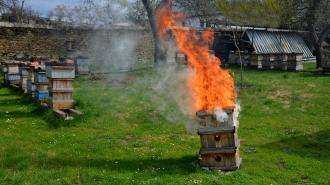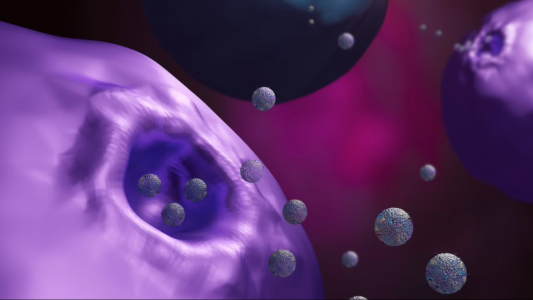A pivotal player in our agricultural system, honey bees pollinate billions of dollars worth of crops each year in the US alone — over 130 different vegetables, fruits, and nuts depend on them.
Protecting honey bees then, in essence, is protecting a diverse food supply, making threats to hives of particular interest to almost everyone. Among the chief concerns for apiarists, farmers, and researchers is American Foulbrood disease, a colony-collapsing bacterial infection — almost the only recourse is incineration of the hive.
Until now.
Honey bees are a pivotal player in our agricultural system. Protecting them means protecting a diverse food supply.
The US Department of Agriculture (USDA) has granted conditional approval to an American Foulbrood vaccine developed by Georgia-based biotech Dalan, which focuses on insect health. The vaccine is the first to be approved for our bestriped buzzing buddies.
“This is an exciting step forward for beekeepers, as we rely on antibiotic treatment that has limited effectiveness and requires lots of time and energy to apply to our hives,” Trevor Tauzer, owner of an eponymous apiary and a board member of the California State Beekeepers Association said in a statement released by Dalan.
“If we can prevent an infection in our hives, we can avoid costly treatments and focus our energy on other important elements of keeping our bees healthy.”
What is American Foulbrood disease? Caused by Paenibacillus larvae, a bacterium that resembles a slightly squished Good & Plenty, American Foulbrood disease is widespread and wildly destructive.
According to the USDA, American Foulbrood can come on slowly, with infected cells turning dark and only a handful of larvae and pupae turning up dead; it may take up to a year to become a colony-killing threat, or could rip through it within a season. When it has arrived, however, it is unmistakable.
“It’s something that beekeepers can easily recognize because it reduces the larvae to this brown goo that has a rancid stink to it,” University of Georgia entomologist Keith Delaplane, who worked with Dalan on the vaccine, told The Guardian.
Among the chief threats to honey bees is American Foulbrood disease, a colony-collapsing bacterial infection. Almost the only recourse was incineration of infected hives.
A colony infected with American Foulbrood takes on a patchy appearance, as afflicted cells are interspersed with healthy ones in the honeycomb, and the spores of the bacteria are fed to larvae by nursing bees, before they are sealed away and die. The spores are then dispersed again by clean-up crews of worker bees.
It may also taint the hive’s honey.
“It’ll kill the hive,” Chris Hiatt, president of the American Honey Producers Association, told NPR. “The brood, the new bees, they will – you’ll have a snotty, disgusting larva come out. It won’t be – you will not hatch out new bees.” Hiatt’s bees were part of the vaccine trial.
Weakened hives may have their infected honey stolen by other bees, or it may spread via traveling swarms or the work of beekeepers themselves.
To prevent this spread, beekeepers administer antibiotics and turn to one of our oldest, most brutal weapons against disease: they burn the infected colonies.
How to vaccinate a bee: The vaccine contains killed-but-intact Paenibacillus larvae bacteria.
It is mixed into the royal jelly that is fed to the queen by worker bees; after ingesting the jelly, the vaccine fragments deposit in her ovary, providing immunity to new larvae as they hatch. Dalan says that efficacy trials indicate it may reduce larval death — results good enough for conditional approval, at least.
The USDA has granted conditional approval to an American Foulbrood vaccine developed by Georgia-based biotech Dalan, the first honey bee vaccine.
Hiatt told NPR that it is “so far, so good” for his 800 or so vaccinated colonies, and commercial keepers like him will be the first to have access to the vaccine.
Vaccination is a new approach to insect health that not long ago would have been dismissed out of hand; as the New York Times pointed out, many scientists believed that insects’ lack of antibodies meant they could not acquire immunity.
Dalail Freitak, Dalan’s chief science officer and a honey bee researcher at Austria’s Karl-Franzens University of Graz, was part of the team that discovered the protein by which insects pass immunity to their offspring. Tool in hand, she took aim at American Foulbrood.
Dalan also intends to develop oral vaccines for other honey bee diseases, as well as similarly under-served agricultural animals like mealworms and shrimp.
“There are millions of beehives all over the world, and they don’t have a good health care system compared to other animals,” Freitak told the NYT. “Now we have the tools to improve their resistance against diseases.”
We’d love to hear from you! If you have a comment about this article or if you have a tip for a future Freethink story, please email us at [email protected].






